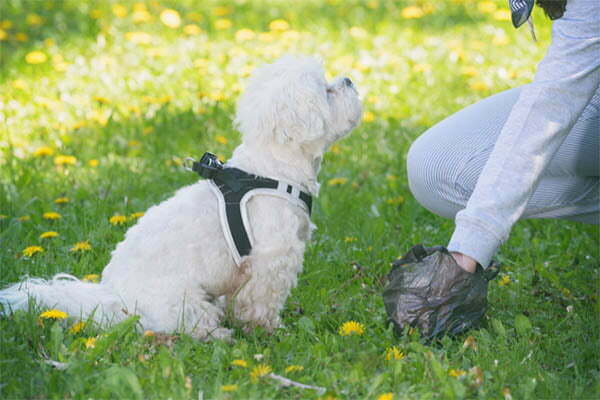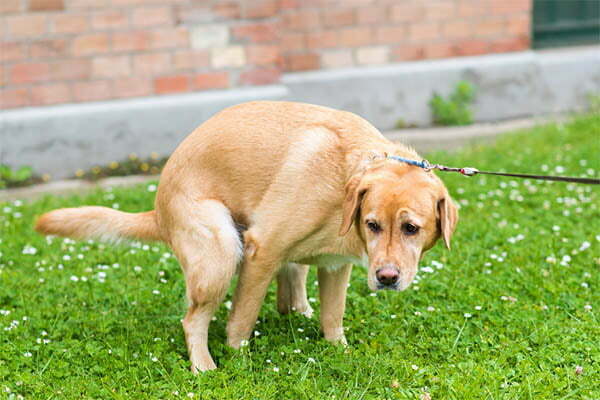Some people are lucky enough to have dog flaps installed in their houses; the ease of this means your dog can pop in and out and go to the bathroom whenever he needs to.

However, if you do not have a dog flap, or your dog flap needs to be locked for some reason, you may start wondering just how long your dog can actually hold off going to the bathroom before he makes a mess all over your floor.
Some dogs may seem like they like to go to the bathroom straight after dinner, and some may seem like they need to wait a bit after food before they’re ready to take a bathroom trip.
In order to find out if you should expect to find a nasty and messy surprise awaiting you when you get home after your dog has been in for some time, doing some research on how long your dog can hold off going to the bathroom is useful.
That is why you are here, right? You are probably also wondering if ‘holding it in’ can make your dog sick. Let’s take a look today at how long your dog can hold it in, and if you should worry about their health if they do.
Beyond this, many dogs actually can hold their poop in, or their pee, or around 8 hours if they absolutely have to. Professionals believe puppies have a much shorter limit of an hour for every month in age they are.
This limit stops at 8 months which averages at 8 hours maximum of holding off bathroom breaks. If you have a 2-month-old puppy, they will be able to hold it for 2 hours, a 3-month-old puppy could hold it for 3 hours and so on.
However, there are also other things you must consider, a good example of this is age.
By this we mean, old age, if your dog is older, or if they have health problems, this may change things. Their diet may also change how long they can hold it for.
Now you know this, let’s take some time and get right down to the facts about how long your dog can hold off going to the bathroom, while you pop off to the store.
How long can Fido hold it after eating?
If you find yourself stuck at work, or in traffic, how long will your dog be able to hold it in for before you get home from work.
There is always the possibility that there may be an emergency situation, and you need to leave the house for a few hours, if this is the case then you may have to leave Fido at home.
If you need to rush off, or if you are busier than a bee. How can you ensure that your dog isn’t going to soil your floors and welcome you home to a foul smell and one hell of a mess?
Similarly, you may also be wondering what you should do with a new puppy who is not house-trained yet and can’t go as long without bathroom breaks.
Or what about an older dog who has urinary or bowel incontinence and struggles to hold in their bowels for very long?
It may be an unpleasant subject, but you need to be aware of how long your dog can go without bathroom breaks, as this will help you deal with all kinds of situations around your dog and bathroom time.
You can plan out your days accordingly so that your dog is not left alone and unable to go to the bathroom for too long. Hopefully this will reduce the chances of your coming home from work to a big mess to scoop out of the carpet.
How long can adult dogs hold it in for?
If you have a healthy adult dog, it should be able to hold off going to the bathroom for around 8 hours after they have eaten.
However, whether or not they will be able to hold it for exactly this long is debatable; every dog is different, just like every human is different, so whether or not this applies to every dog is a debated topic.
If your dog is forced to hold it in for too long they will become uncomfortable, and they will be desperate to relieve themselves as soon as possible.
I am sure you have been there once or twice in your life, when a meeting has dragged on longer than you expected, and you have been dying to go to the bathroom for the last half hour.
It is no different for dogs, except they aren’t stuck in a meeting waiting for the time to run to the bathroom, they are waiting for your meeting to finish and for you to give them the bathroom break they desperately need.
This means that most dogs will avoid waiting for this length of time and save themselves from this discomfort by relieving themselves sooner.
This can even happen with a dog that has been house-trained, which may surprise some owners.
But think about it, you are house-trained as a person, but even if you hold it in for long enough and try to hold off going to the bathroom for hours, eventually you would probably end up having an accident too.
Any dog would prefer the scolding of having made a mess on the floor, than be in discomfort for hours.
So, just have a think, if your dog does soil your carpet, consider how long you have been gone for and how uncomfortable your dog must have been. Try to time your day so that your dog doesn’t have to go hours in discomfort, or put in a doggy door flap.
Refrain from getting angry if your dog does have an accident, be patient. Use comforting words and actions to reassure them and then let them go for a walk as soon as possible.
We all know how horrible it is to need to go to the restroom so desperately, it can be really stressful on our bodies if we cannot find a place to relieve ourselves.
Dogs are no different, and they experience the same pains too.
If your dog is housebound and unable to go to the bathroom for between 4-6 hours, see if you can call up a friend or relative who can go to your house and let your dog out to go to the bathroom.
You should do all you can to not leave your dog for longer than this; they may start to get anxious and will possibly damage objects or furniture around your home.
Puppies should only be left for 1 to 2 hours alone, as they could develop behavioral problems if they are left alone for too long.
There are several other things you should consider that affect the length of time your dog can go without a bathroom break, for example, older dogs or dogs with or recovering from health issues.
Can old/ sick dogs hold off bathroom time?
If you have an older dog, you are probably aware they cannot hold their need for the bathroom for long periods of time. Their muscles get tired as they age just like ours do, and holding it in, is a much bigger challenge.
In comparison to younger dogs, older dogs will also likely need to poop and pee more frequently, and some dogs may need to relieve themselves after every meal.
In many ways, older dogs are a lot like puppies, and they should be taken out in order to go to the bathroom often. This will resolve any potential issues of them pooping in the house.
Much like how we compared older people to children sometimes, older dogs and puppies are also alike, they also need care, consideration, specific diets, and more bathroom breaks.
This is similar again if you have a dog that is sick or recovering from an operation.
They will likely need more bathroom breaks too, and will need to empty their bowels after a shorter period of time. You should consult your vet if this is the case and keep an eye on your dog’s stools to ensure that there are no abnormalities.
Can puppies hold it in for long?
With puppies, it varies, a puppy can only hold its bowels for the amount of time equal to its age. This means that a 4-month-old pup can hold its bowels for around 4 hours. In contrast, a 1-month-old pup can only hold their bowels for an hour.
The puppies age and how long they can hold their bowels for is equal to their age, which is an interesting coincidence. This time to age coincidence continues until the pup reaches about 8 months old, where it levels out, and they will be able to hold their bowel as long as a healthy adult dog can.
- This means an 8-month-old pup can hold their bowels for 8 hours.
- This means a 6-month-old pup can hold their bowels for 6 hours.
- This means a 2-month-old pup can hold their bowels for 2 hours.
All puppies are unpredictable, so do not rely entirely on this rule. Unless they are house-trained they will also likely poop and pee whenever, and wherever they feel like doing so.
This also depends a lot on personalities, it can take a lot of trial and error, a lot of mess and accidents until your pup can be relied upon to not poop in the house.
If you do own a puppy then you should be aware of the signs that show they are about to do their business.
Signs of a puppy about to go to the restroom can be seen in scratching, barking, circling, and any other restless behaviors.
Can dogs get sick from holding it in?

In theory, yes. However, anyone can get sick if they hold their poop in. When feces are held in, it can reabsorb into the body, it can lead to fecal bacteria overload and cause abdominal pains.
However, it is unlikely that a dog will have the control or the desire to hold their poop in for so long that it would make them sick. The only exception to this is if they have a medical problem relating to constipation or something similar.
In fact, it is much more likely that you would get sick from holding in your poop than your dog would, as we are more likely to hold it in for longer than a dog will.
What should you do if your dog hasn’t pooped for a whole day?
What should you do if your dog hasn’t relieved their bowels in 24 hours? Well, a healthy dog should be going every day, and they can even go up to 5 times a day. So, if your dog doesn’t poop at all within 24 hours then it is very unusual.
If you find that your dog has not relieved themselves in a whole day, then this means that they are likely constipated, and you should be on the phone with your vet as soon as possible.
How many times a day should a dog poop?
There is no exact number of how many times in one day a dog should relieve their bowels. It can often change due to several different factors.
However, a majority of dogs will need to go to the bathroom to relieve their bowels between 1 to 5 times per day.
Puppies are different; they will have to go more frequently, as will older dogs; this is totally normal. As we have said, older and younger dogs often have more erratic bodily functions than a normal adult dog does, similar to humans.
Some dogs, however, may suffer from constipation. There are breeds that are very prone to this. If this does happen, then your dog may not poop for up to 24 hours.
Some vets will even say that it is okay to let your dog have constipation remedies that are designed for humans. But if you can get one specified for dogs, this is even better.
To ease constipation in dogs, you can add fiber to their meals; this can include canned pumpkin, olive oil, and spinach. These are all high-fiber foods.
If your down shows no improvements, then you should take them to see the vet, especially if they have had no bowel movement for two days. They can properly diagnose the issue and treat it properly.
Similarly, dogs can get diarrhea as well. This can be triggered by many things, but it is mainly caused by eating rubbish or rotten foods.
Sudden changes in diet, stress, and bacterial or parasitic infections can also cause these things. Diarrhea commonly lasts for a short period. However, chronic diarrhea is a possible problem; if this is the case, make sure they get plenty of water to prevent dehydration. If it continues, take the dog to the vet.
Summary
Wondering about your dog’s bowels isn’t something you think you’ll find yourself wondering about often.
However, knowing the answer to questions like these can be very useful, there may always be a time when this knowledge comes in handy.
Just remember, don’t make your dog hold it in for too long, if you’ve got to go, you have got to go.
